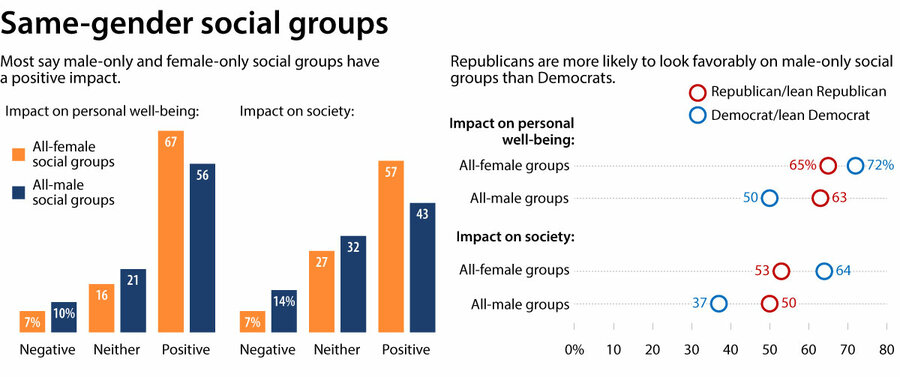America’s loneliest generation? It may not be the one you expect.
Loading...
How often do you feel lonely?
The Pew Research Center posed that question to over 6,000 U.S. adults. Its new survey found that 1 in 6 adults feels socially isolated all or most of the time. It’s another marker of the “loneliness epidemic,” a term coined by Surgeon General Vivek Murthy. What surprised Pew researchers was who feels loneliness most acutely.
One might imagine that older Americans are more isolated than young people and thus more forlorn. Turns out, older generations feel least lonely. The difference may come down to how members of different generations engage with others. People under 30 years old are far more likely to communicate with friends via texting or social media, according to the “Men, Women, and Social Connections” study. The opposite is true for those over 65, who also said they tend to feel more optimistic all or most of the time.
Why We Wrote This
A story focused onAmericans now spend more time alone. Is isolation the price of technological convenience?
“Men and women aren’t really that different,” says Kim Parker, director of social trends research at Pew. “If there is a major fault line, it’s more along age than it is along gender.”
Technology has made it easier than ever to communicate with others. We can work from home. Get meals and groceries dropped off at the door. Multitask by playing video games with someone halfway across the world while posting emojis on social media. But it’s at the expense of in-person interaction.
“People start to lose social skills,” says Mike Veny, a renowned corporate wellness specialist who focuses on mental health. “It just makes it harder for even extroverts to develop real relationships.”
The Pew survey found that both women and men turn to their spouse or partner, if they have one, for emotional support. But women have more extensive social networks. When faced with loneliness, women are more likely to reach out to their mothers, a friend, another family member, or even a mental health professional than men are.
There’s a real benefit to men spending social time with other men, says Ms. Parker. But there are ongoing debates about men’s groups. Are they hotbeds of “toxic masculinity”? Or valuable bulwarks for those who feel adrift? As a follow-up to its 2024 report “How Americans See Men and Masculinity,” Pew’s new survey explores perceptions of men’s groups. Attitudes differ according to political party identification. Republican males are most likely to view men’s groups as having a positive impact on society.
So what can one do to counter loneliness? Friendship experts say that people need to be intentional about setting aside time for in-person socializing. Relationships are built on trust, says Mr. Veny. That means making appointments and then keeping that commitment.
Ask yourself which values, interests, or needs aren’t being met, says Glenda Shaw, author of “Better You, Better Friends: A Whole New Approach to Friendship.” Look for groups that share those values. For example, volunteer at an animal shelter or enroll in a night class on creative writing. See whom you meet.
“The emphasis is about working together on a project rather than ‘Do I like them?’” says Ms. Shaw. “You have something in common on which to build. ... At the end of the project, you say, ‘Hey, why don’t you come over for dinner?’”
Also, if you notice someone who seems lonely, extend an invitation. It could be the beginning of a beautiful friendship.








